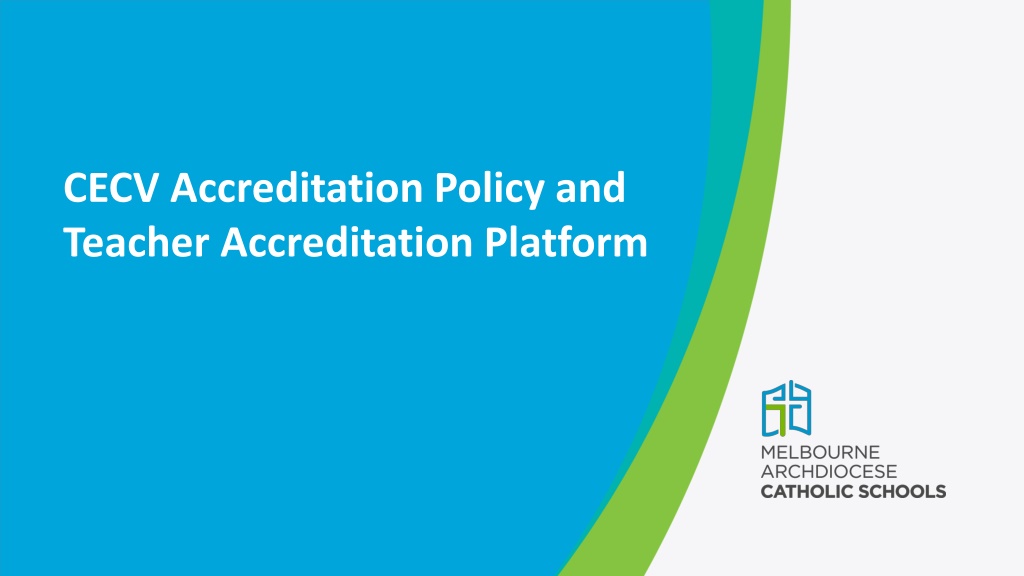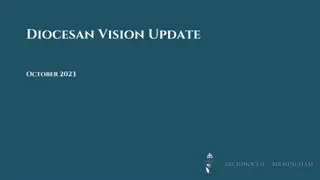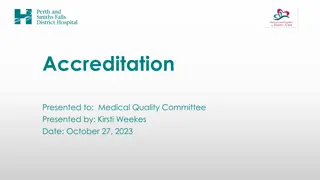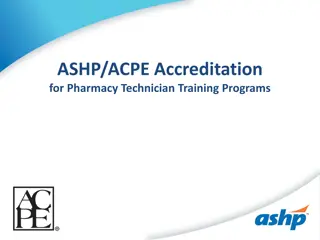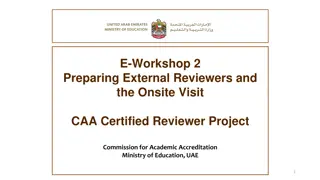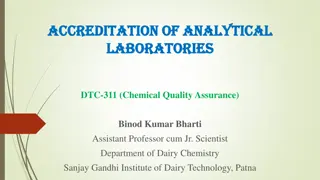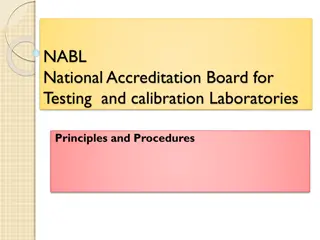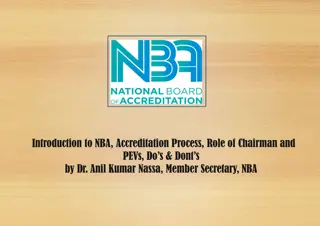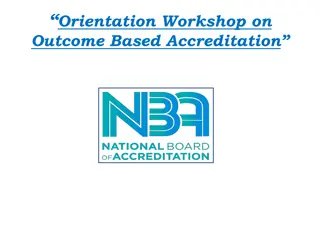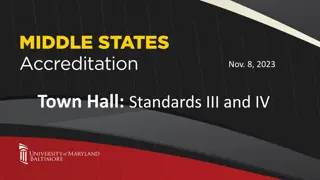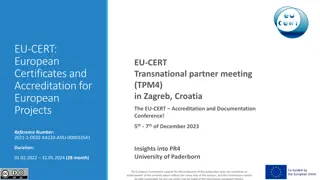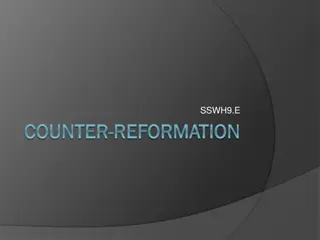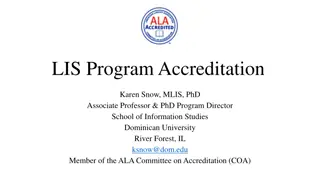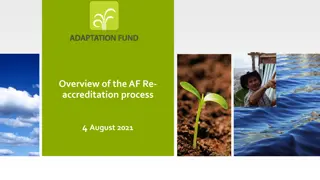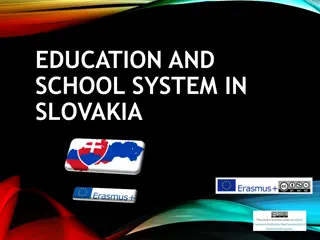Understanding the Purpose and Levels of Accreditation in Catholic Schools
Catholic schools have an accreditation policy to ensure leaders and teachers uphold the Catholic faith while educating students. Through ongoing professional development, educators are equipped to serve within the specific Catholic context of schools. The accreditation process aims to support educators in developing their knowledge of the Catholic faith and tradition. There are two levels of accreditation: one for teaching in a Catholic school and another for teaching religious education or taking on leadership roles.
Download Presentation

Please find below an Image/Link to download the presentation.
The content on the website is provided AS IS for your information and personal use only. It may not be sold, licensed, or shared on other websites without obtaining consent from the author. Download presentation by click this link. If you encounter any issues during the download, it is possible that the publisher has removed the file from their server.
E N D
Presentation Transcript
CECV Accreditation Policy and Teacher Accreditation Platform
Acknowledgment of Country In recognition of Aboriginal and Torres Strait Islander people s spiritual and cultural connection to Country, we acknowledge the traditional custodians of the lands on which we meet and educate our children. We recognise the continued care of the lands and waterways passed from generation to generation, wisdom that is shared, and life that is celebrated in harmony with the natural environment. We honour the Elders past and present who have laid the foundations, traditions, and culture for emerging Aboriginal and Torres Strait Islander peoples and we commit to working together for reconciliation and justice. Bunjil the Spirit Creator Archie, Year 3 Sacred Heart School, Sandringham 2
As we gather today, we pray in solidarity with all who work in our Catholic schools, that we might become communities which truly - honour the sacred dignity of each person - - search for truth - - embrace difference and diversity - - build a culture of learning together - - engage with the deep questions of life - - honour equitable access and opportunity for all - - commit to achieving the highest standards possible - and - make a difference in the world - Amen HORIZONS OF HOPE PRAYER 3
Why do we have an accreditation policy? Leaders and teachers in Catholic schools are central in ensuring that students experience an education which is truly Catholic in its understanding and intent. Our Catholic faith calls us to embrace the contemporary world with a Catholic imagination, and a particular hope-filled view of the human person and all of creation. Catholic educators invite students to make sense of their world and their lives within a faith community that is faithful to the mission of Jesus. (Horizons of Hope, Vision & Mission, p9) If that is the case, leaders and teachers need ongoing formation through professional learning in Catholic thought and practice. 4
The accreditation process aims to: support leaders and teachers who are entering or continuing their service in Catholic education to develop their knowledge and appreciation of the Catholic faith and tradition enable leaders and teachers to place their ministry in the specific Catholic context of our schools. 5
Levels of Accreditation There are two levels of accreditation in recognition of the different roles that leaders and teachers undertake: Accreditation to Teach in a Catholic School Accreditation to Teach Religious Education or Lead in a Catholic School Each level must firstly be GAINED, as with the previous policy, but then must be MAINTAINED. 6
Categories for Accreditation activities The following categories apply to gaining and maintaining BOTH levels of accreditation. A. The aims and objectives of the Catholic school B. Catholic curriculum, Religious Education and faith development C. Catholic identity, culture, tradition and theology (including prayer, liturgy, scripture and Catholic social teaching). Catholic Curriculum refers to the Catholic context and teachings related to learning areas other than Religious Education (e.g. Catholic teaching on bio-ethics in relation to the Science curriculum). 7
Level 1 Requirements All teachers are required to gain and maintain Level 1 Accreditation to Teach in a Catholic School. Teachers entering Catholic education without Accreditation to Teach in a Catholic School are granted a five-year period from the commencement of employment to secure their accreditation. 8
Requirements for gaining and maintaining Accreditation to Teach in a Catholic School (Level 1) Gaining Accreditation is gained by : Maintaining Accreditation is maintained by: 25 hours of professional learning or formation balanced across the three categories in each five-year period following the initial gaining of Level 1 accreditation. 25 hours of professional learning balanced across the three categories within five years of being employed. 9
Level 2 Requirements All teachers of Religious Education and Catholic school leaders are required to gain and maintain Level 2Accreditation to Teach Religious Education or Lead in a Catholic School. The policy specifically refers to leaders as those holding Principal or Deputy Principal roles, but it is highly recommended that those in other senior leadership positions in schools work towards attaining this level of accreditation. 10
Requirements for gaining and maintaining Accreditation to Teach Religious Education or Lead in a Catholic School (Level 2) Gaining Maintaining Accreditation is gained by : Accreditation is maintained by: Formal, assessed study in Religious Education/ Theology/ Catholic Leadership within five years of being employed (courses are approved by agreement of the diocesan Heads of Religious Education). 50 hours of professional learning or formation balanced across the three categories in each five- year period following the initial gaining of Level 2 accreditation. A qualification in Catholic Leadership (e.g. a master s degree) must include four units of Religious Education or Theology (or equivalent). 11
OLD POLICY NEW POLICY 2 Policies: 1.6 Accreditation to Teach in a Catholic School 1.7 Accreditation to Teach RE in a Catholic School 1 Policy, two levels: Accreditation to Teach in a Catholic School Accreditation to Teach RE or Lead in a Catholic School Accreditation to Teach in a Catholic School - 50 hours of professional learning Accreditation to Teach in a Catholic School - 25 hours of professional learning (and then 25 hours each subsequent 5 years) No formal requirement to maintain either Accreditation Formal requirement to maintain Accreditation at both levels 12
A baseline for school accreditation programs The following practice is already common in many schools and will fulfill in an on-going way the policy requirements for staff to gain and maintain Accreditation to Teach in a Catholic School. One in-school PL Day for staff related to Catholic Mission and Identity and approved for accreditation which covers a broad range of the categories needed in the policy. (5hrs) 5hrs per year x 5 years = 25hrs 13
Maintaining the next level of accreditation Once teachers have completed the course-work necessary to gain Accreditation to Teach R.E. or Lead in a Catholic School, a common way that many maintain that accreditation is by participating in: A school PL Day for staff related to Catholic Mission and Identity and approved for accreditation (5hrs) Another 5hr day PL, or 5hrs worth of separate PLs, which are approved for accreditation. This may be offered in-school, as part of the MACS PL program, or by other providers. 5hrs + 5hrs per year x 5 years = 50hrs 14
TEACHER ACCREDITATION PLATFORM The online Teacher Accreditation Platform (TAP) has been developed to assist schools to implement the CECV teacher accreditation policy. 15
TEACHER ACCREDITATION PLATFORM In the short-term, TAP will enable schools to more easily Apply for in-school professional learning to be approved for accreditation Allow teachers to apply for accreditation online Generate their own reports related to accreditation for a range of purposes. 16
TEACHER ACCREDITATION PLATFORM Over the next few years, as school generated data becomes more substantial on TAP School reports related to accreditation will become more substantial and accurate Teachers will be able to access information to track their standing in regards to gaining or maintaining accreditation 17
Management of TAP at school level It is recommended that each school designates a staff member/s to become expert in how to use the site and to coordinate their present school accreditation process and records with the requirements of the site. Principals will need to give administrative access to the staff members involved. 18
Resources related to TAP A range of resources have been prepared to assist schools and external providers to understand and work with the platform. These include how-to videos, manuals and FAQ resources. Resources are available on CEVN. 19
James Goold House, 228 Victoria Parade, East Melbourne VIC 3002 T: +61 3 9267 0228 E: execdirector@macs.vic.edu.au www.macs.vic.edu.au
